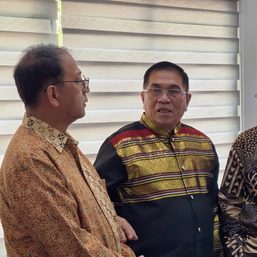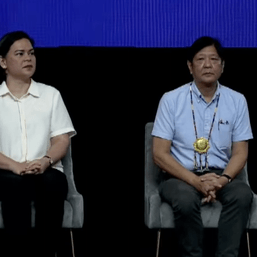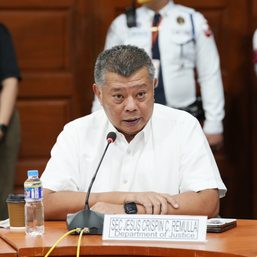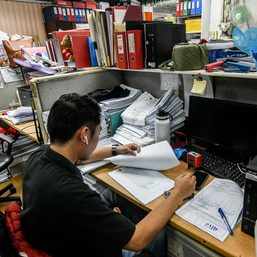SUMMARY
This is AI generated summarization, which may have errors. For context, always refer to the full article.
![[OPINION] Time for a law for EDSA anniversary holiday](https://www.rappler.com/tachyon/2023/10/EDSA-Anniversary-Holiday-October-14-2023.jpg)
Compared to Ninoy Aquino Day which is officially declared a special non-working holiday under Republic Act 9256, making the EDSA People Power anniversary a similar holiday has been left to the discretion of presidents.
The two closest things to a law marking the 1986 uprising don’t provide for a national holiday: the Human Rights Victims Reparation and Recognition Act of 2013, and Joseph Estrada’s 1999 executive order forming the EDSA People Power Commission.
If people are not vigilant, any president can possibly delete it from the list of holidays, without violating any law.
That’s the case again this coming 2024, when President Bongbong Marcos excluded it from the list of the year’s holidays.
Cory Aquino
On February 11, 1987, President Corazon Aquino signed Proclamation No. 59 declaring February 25 of that year as a “national non-working special public holiday” to mark what she said was the “culmination of the February 22-25 Revolution.”
In her proclamation, Aquino said it is “fitting and proper to afford the Filipino people the full opportunity to celebrate the first anniversary of February 25, 1986 with appropriate ceremonies to assure that its national import and significance will be fully appreciated.”
Since then, presidents have issued proclamations declaring February 25 as a special day, a special non-working holiday, or a special holiday for all schools.
In 1988, Mrs. Aquino’s Proclamation 217 dubbed February 25 as a “special day.”
However, Mrs. Aquino apparently did not issue any EDSA-related proclamations for 1989, 1991, and 1992, per the online archives of the Official Gazette and the The LawPhil Project of the Arellano Law Foundation.
By 1991, Mrs. Aquino had allowed the deposed dictator’s wife Imelda Marcos and their children to return to the Philippines. Despite the government’s opposition, Marcos human rights violation victims won the landmark class action suit against the Marcoses in the US federal court.
Imelda joined the 1992 presidential elections, finishing fifth in a field of seven candidates.
Fidel V. Ramos
President Fidel V. Ramos, who figured prominently in the military aspect of the EDSA People Power uprising, issued Proclamation 142 and Proclamation 331 which declared February 25 as a “special non-working holiday” in 1993 and 1994.
For 1995, since February 25 was a Saturday, Ramos declared it a “special day.”
Imelda Marcos won a House seat in the same year, representing Leyte’s first district.
In 1996, Ramos did not issue a holiday proclamation for the EDSA anniversary. He mentioned the commemoration though in Proclamation 720 declaring February 25 as a “National Ecumenical Day of Prayer and Reconciliation.”
Ramos made no EDSA holiday proclamations as well for 1997 and election year 1998.
1998 proved a major milestone for the Marcoses. Although Imelda Marcos ran and lost anew in the race for president, daughter Imee won the first term of her three terms as Ilocos Norte representative. The dictator’s namesake and son Ferdinand “Bongbong” Marcos Jr. also won the first of three terms as Ilocos Norte governor.
Joseph Estrada
During his brief presidency, President Joseph Estrada did not proclaim February 25, 1999 as an EDSA anniversary holiday.
But Estrada signed Executive Order 82 establishing the EDSA People Power Commission, which has since been the lead agency tasked with commemorating the historic event.
Estrada issued Proclamation 242 designating February 25, 2000 as a “special national holiday.” It would turn out to be his last EDSA anniversary as president.
A second EDSA uprising would oust him in January 2001.
Gloria Macapagal Arroyo
Perhaps because the new revolt that catapulted her to the presidency was still fresh, President Gloria Macapagal Arroyo did not bother to make another EDSA anniversary holiday in 2001.
From 2002 to 2005, Arroyo issued proclamations 151, 331, 549, and 785 designating February 25 as a “special national holiday.”
By 2006 and 2008, Arroyo’s proclamations 1015 and 1462 dubbed February 25 as a “special non-working holiday.”
2007 was different as Arroyo’s Proclamation 1224 called on the government and the public to mark February 22-25 of every year as “EDSA People Power Commemoration Week.”
Arroyo’s last two years in office saw the EDSA anniversary turned into a “holiday for all schools.”
Noynoy Aquino
Buoyed in the campaign following the death of his mother, and by massive anti-corruption protests, Noynoy Aquino became president in 2010, the same year Bongbong Marcos was elected senator. Imee took over Ilocos Norte’s gubernatorial post.
From 2011 to 2015, Aquino maintained the EDSA anniversary as a “special holiday for all schools”.
In his last holiday proclamation for 2016, Aquino however upgraded it to a “special non-working holiday.”
Rodrigo Duterte
Although Rodrigo Duterte kept the EDSA anniversary in all his holiday proclamations from 2017 to 2022 as a “special non-working holiday,” he allowed the hero’s burial for the dictator at the Libingan ng mga Bayani within months from assuming the presidency.
Bongbong Marcos nearly won the vice presidency, but was fended off by Leni Robredo.
In 2017, perhaps as a consolation, Duterte amended Estrada’s executive order forming the EDSA People Power Commission, designating as its head the chair National Historical Commission of the Philippines, instead of the Executive Secretary.
Duterte’s amending EO also transferred to the NHCP the management, maintenance and upkeep of the People Power Monument at EDSA corner White Plains. Imee Marcos won a Senate seat in 2019.
Bongbong Marcos
The Duterte and Marcos families coalesced to win the 2022 elections by a big landslide.
Bongbong Marcos and running mate Sara Duterte took their oath on June 30, 2022.
In his Proclamation No. 90 designating holidays for 2023, Marcos included the EDSA anniversary of February 25.
But just days prior, Marcos changed his mind and moved the holiday to February 24.
“To enable our countrymen to avail of the benefits of a longer weekend pursuant to the principle of holiday economics, the celebration of EDSA People Power Revolution Anniversary may be moved from 25 February 2023 (Saturday) to 24 February 2023 (Friday), provided that the historical significance of EDSA People Power Revolution Anniversary is maintained,” stated his Proclamation 167.
A furor has erupted over Marcos’ proclamation for 2024 holidays that did not include the EDSA anniversary at all.

Law needed
Removing it from the list of our national holidays, on the flimsy reason that it falls on a Sunday in 2024, proves the Marcos regime’s low regard for the historic event.
Although it falls on a Sunday, the president should still include it to benefit workers and students who toil on weekends, to personally lead all government in proper and fitting commemorations, and to show to the public the government’s gratitude for their taking direct sovereign action at restoring democratic institutions and processes.
It is about time we have a law for the EDSA anniversary. Maybe Speaker Martin Romualdez, Senate President Miguel Zubiri, ACT Teachers Representative France Castro, Gabriela Representative Arlene Brosas, Kabataan Representative Raoul Manuel, Albay Representative Edcel Lagman, and senators Risa Hontiveros and Koko Pimentel could quickly see this through a law or a joint resolution.
Marcos should endorse its immediate approval and sign it into law. – Rappler.com
Tonyo Cruz is an opinion columnist for the Manila Bulletin. He was former assistant vice president for Luzon and deputy secretary-general of the CEGP, and later served as public relations officers for activist groups and activist members of Congress.
1 comment
How does this make you feel?


![[In This Economy] Is the Philippines quietly getting richer?](https://www.rappler.com/tachyon/2024/04/20240426-Philippines-quietly-getting-richer.jpg?resize=257%2C257&crop=194px%2C0px%2C720px%2C720px)


First, this statement should be clarified: “Despite the government’s opposition, Marcos human rights violation victims won the landmark class action suit against the Marcoses in the US federal court.” Whose Government? Under what administration? Second: “… Marcos regime’s low regard for the historic event.” This should not be surprising, the Marcos Disinformation Machinery even wants its erasure from Philippine History. Third: “It is about time we have a law for the EDSA anniversary.” I certainly and strongly agree. Fourth: “Marcos should endorse its immediate approval and sign it into law.” This is very, very doubtful. The proposed law may not even make it to the Committee Levels in both the Senate and Lower House. But the Minority Opposition SHOULD TRY anyway so that we will have pieces of evidence of how these Legislators really think and believe and also about the mind of President Marcos Jr. himself. Lastly, about President Marcos Jr., always bear in mind the influences of Senator Imee Marcos, cousin Speaker Romualdez, son Sandro, etc., and most especially his most beloved wife – Liza Araneta-Marcos.